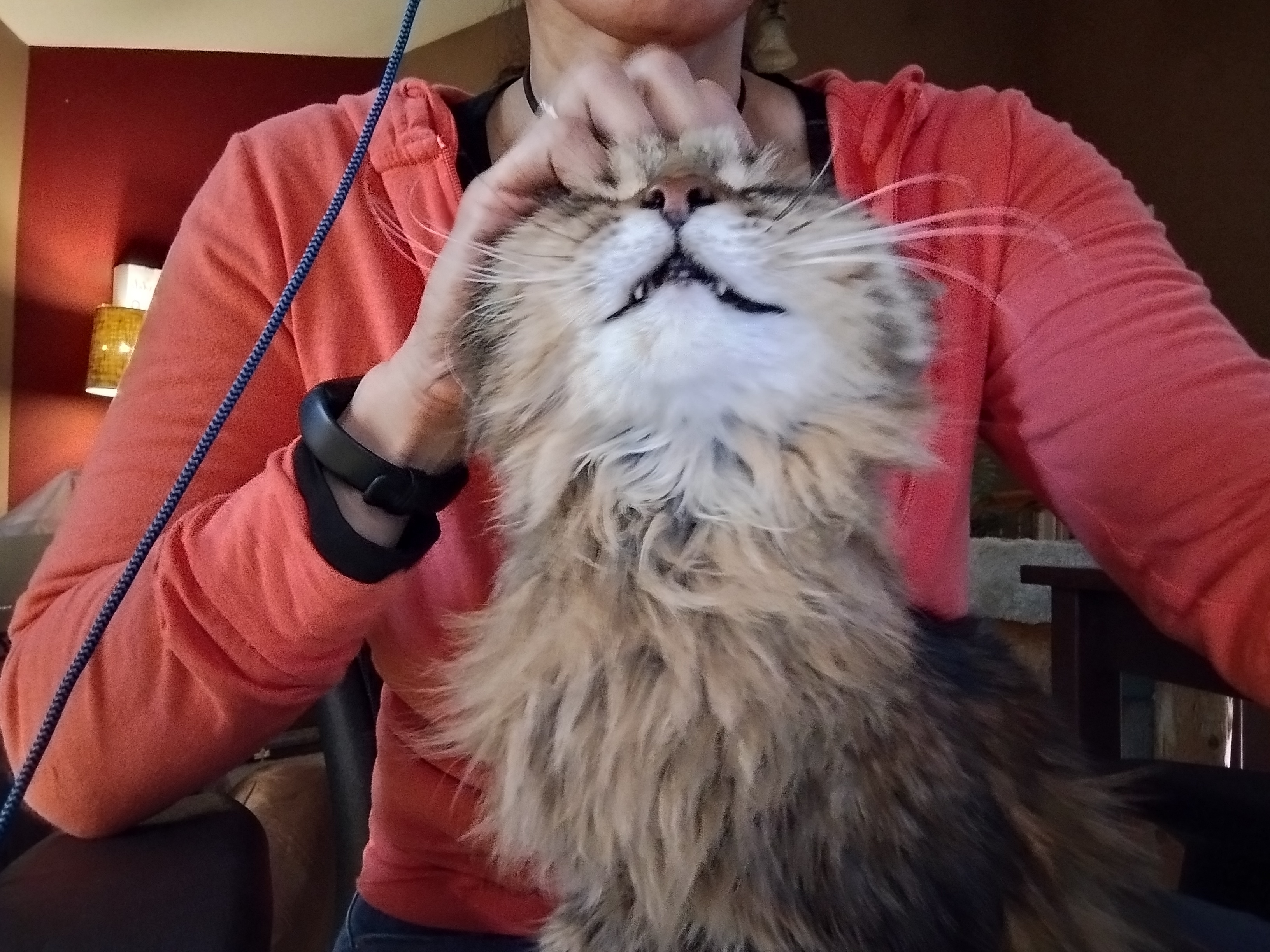
I saw someone leave their cart next to their car and get back in the car. So I grabbed it and put it in the corral a few spaces away. That person drove back through the parking lot to tell me to “mind my own business”. I still get a little schadenfreude about how upset they were over their own conscience and perceived social judgement.

“Mind your own business” is such a perfect encapsulation of how completely incapable of self-reflection that person must be.
The cart was no longer their business, but yours. So not only couldn’t they recognise that the judgment they felt came from within, they projected that feeling outwards so hard they ended up sticking their nose into your business about it.
That’s how they avoid learning basic life lessons like, “I should return the cart,” because as soon as they hit the “I should” part they freak out and make it everyone else’s problem.

Why not use the European system where you have to use a coin to unlock the cart from the stack. People are more likely to return the cart if it costs them money if they don’t and if they still leave the cart out some kid or hobo will return it eventually.

Some stores in the US do this, most notably Aldi. It’s kind of a pain in the ass, especially in an increasingly cashless society.

Names a European store.
They sell like coin shaped discs you can put on your keyring, dunno if that’s a thing in the US though.

Yes, I know Aldi started in Europe.
My point was, they have stores in the US, and their stores in the US also do this. Which is unusual for US stores. Trader Joe’s, for example (which is also owned by one of the Aldi companies) just has regular carts without the coin chain things.

[ Removed by Reddit ]

That’s not correct, actually. There were two brothers who inherited Aldi, and they did have a falling out over cigarettes, but they actually split the company in two - Aldi Nord (North) and Aldi Sud (South). As the names imply, they operate the Aldi stores in North and South Germany respectively.
In other countries, either Aldi Nord or Aldi Sud operates the Aldi stores, but they do not directly compete with each other. The exception is the US, where Aldi Sud operates the Aldi stores and Aldi Nord operates Trader Joe’s (which the original owner of Aldi bought from Joe Coulombe in 1979).

Huh, that sounds familiar too. Looks like I screwed this up last time I researched the history of Trader Joe’s for some post like this.

I mean, yeah. Aldi is European but has locations in the US. They’re the only store here that does this afaik. I’ve never seen the keyring thing but sincw no other stores need a coin I’d have to shop at Aldi a lot to justify ordering one online.

It was tongue in cheek. But it does make sense a European chain would bring that over to the US.

They give those out at the shop info where I live

Can we just use the nordic system where people are not fucking savages and bring their carts back? I hate people who don’t return their carts but I hate even more when I need coins to unlock the cart. I haven’t carried coins since 2014.

I live in a Nordic country, we have carts which need a coin, most people have a thing on their keychain to unlock a cart, majority of carts are returned.

You can and will replace the coin with something worthless of equal shape and size.

As an American, coins are already basically worthless.

Some might think it’s the price for a cheap shopping cart. In German there was a comedian who did a prank call at a store, telling them he bought 500 carts for 500€ and use them as rabbit cages.

German
ComedianThe math ain’t mathing here.

Oh of course the Europeans have done it better than us

Food Maxx in the U.S. employed this in low income areas to prevent cart thefts. So, that’s nice.

If you want to prevent theft then I feel like 50 cents deposit isn’t going to cut it

This is how it is at about half the big grocery stores where I live in Canada

My local aldi does this and still when I get there I find like 3 trolleys scattered around the tiny carpark. I can only grab like two max to take with me to the pen.

Yeah. For a lot of people a quarter is nothing and worth tossing for the convenience of not being a decent person.

Fine, they can subsidize the cart retrieval employee cost.
Also I discussed this with someone in the UK once and they pay an entire pound for a cart… we do quarters because it’s the largest denomination common coin in the US.

Wait is that an european only thing?

Because then we can’t use it as an arbitrary metric for judging people’s moral righteousness.

Counterpoint:
The Wholefoods in Redmond, Wa is known as Hellfoods by their employees because of how cold people are there and how overbearing management can be. It also is in one of the most beautiful parts of the country. When I worked there, I love the warm summer evenings when I could go out to the outfield to fetch a cart because I got to be outside and no longer under the micromanagement that is retail.
When I would clock off, sometimes I’d nab a cart and send it out on purpose for the guy behind me to give them an escape.

Did every other employee feel the same way as you? Because otherwise that’s not a counterpoint.

But you could say the same for the original premise- not every employee hates getting rogue carts, in fact many like getting them.
I gave an anecdotal point, but the broader argument simply questions one of the assumptions of OP.

Their job is already to gather carts from the corrals. Putting carts in the corrals allows employees to gather carts if they enjoy it without it being an extra inconvenience if they have a time limit. Also like 99% of employees would say they dislike people who leave carts everywhere, especially when they, you know, are a threat to cars if they roll into someone’s vehicles, hence why cart corrals are a thing in the first place. I certainly don’t want carts taking up parking spaces or rolling into my car if it gets windy.

I’ve been on both sides of this and it really depends on what management is expecting at the time. If “cart run” is a considered a task unto itself then it can be bliss, but if you’re short staffed then management starts to look at “cart run” as a means to an end. When the expectation becomes that you’ll be back on register in 10-15 minutes (but all the corrals out front are now full and no customers are complaining about it), then all those wayward carts mean you gotta hustle.
When I eventually found myself in a supervisory role, I remembered that and tried to equitably rotate between everybody that I knew liked doing carts (or offer when I could tell someone was getting burnt out/long day and needed to go outside for a while) and just let them do their thing. Mostly people really appreciated that and in those cases it was gratifying to be the cool supervisor, but I hated that my responsibility had become to ensure that the front carts were acceptably full at any given time rather than to gather the carts – all it takes is a random rush and suddenly there are no carts and a micromanagey shift lead is chewing you out because they only appear at moments like these (or immediately after the rush while everyone is catching their breath to ask why you can’t find something to do) and your guy outside was just standing in the back of the lot smoking a cigarette, the shift lead doesn’t care that there were carts mere minutes before they arrived on the floor, nor that the cart runner only just started that cig after gathering all the carts strewn into bushes and discarded between cars or down the sidewalk…
god I don’t miss retail lol

In Europe, you have the incentive of getting a coin back

Depends on the store. My local IKEA at least does not require a coin.

No free Litmus test for us, sad.
You can still get the test!! Hear me out if you have two keys you can press the buttons to disengage the locking mechanism as if it were a coin
This way the cart is now coin free, I do this all the time you just need the right key and a bit of practice

Wait this isn’t standard practice in the rest of the world???¿???

It is at Aldi (and maybe Lidl?) but uncommon in general in the US

Aldi used to do that in the US. Maybe they still do. I never carry coins on me, so for this reason (and the always extremely long lines at checkout) I never shopped there.

There are plastic coins you can use instead.

The shopping cart theory, as written here, starts as a litmus test for whether a person is capable of self governing and descends into two paths:
- If you do return the cart you are doing it out of the goodness of your heart and because it is correct; and
- If you don’t you are no better than an animal, a savage, who does what is right only because there is a law in place or you are forced to.
Self-governance: Are you a good person or a monster? There is no middle ground.
WRONG there is a third option where i take the cart home and eat it with my teeth 😬

Or, when people live within walking distance of the store, take the cart home, unload your groceries and then leave the cart by the street.

Become ungovernable

InB4 “If everyone returned their shopping carts it would eliminate jobs” idiots come into the thread.

The people putting the carts back are spending what, 1-2hr/8hr shift doing carts? The rest is either cleaning or stocking so it’s not like they won’t just do more of that.

Yes, they would have 2 hours a day more time to clean and stock the shelves. Making their job easier.

I mean, the image shows a cart corral (sp?). They still need someone to collect the carts, they just don’t have to chase them down or pull them off the curb
Not everywhere has those, but most places do

I am glad I live in a place where many grocery stores don’t have this problem, because they don’t have parking lots, because most of their customers don’t even have a car much less would drive it to get groceries if they did. (Yes, I do realize how fortunate I am.)

That original 4chan post is like Jordan B Peterson level, which says more about JBP than the 4chan poster.
Maybe we should make a game show titled “Are you more intellectual than a right-wing grifter?”.

Every time I fail to return a shopping cart on a beautiful spring day, the grocery store’s Cart Gatherer thanks me kindly and calls, “Thank you kind citizen for giving me leave to leave the hellhole that I was stuck in because the world is filled with assholes who are stealing my job! I want to be in the sunlight! Don’t take that from me!!”

A long time ago I worked at a grocery store and I preferred it when people didn’t return the carts. Would you rather spend your day gathering carts outside or gathering carts for 10 minutes at a time and then having to deal with customers?

Depends on the weather

I’d still rather be outside than dealing grocery store customers in the snow, rain, cold, or heat.

I’m just curious, did you bring the carts in in smaller batches so you’d have to make more trips and the whole task would take longer?

Yeah. Way longer. It’s a much quicker job when all the carts are in one spot and you just bring a long train of them back at once.

It’s surprising to me US carts don’t have to be unlocked by a coin (which you get back when you lock your cart again), it’s like that in every supermarket I know in France and Germany and probably many other European countries.
You can misbehave but it costs you a little bit, and if you do someone has the opportunity to make a buck off you by cleaning after you.

In fairness, that’s been phased out in many places.
I suspect less out of faith in humanity and more out of the reality that many people don’t carry cash, much less change, anymore and they kept annoying the cashiers.

Yeah it’s hard to justify carrying coins around, they’re not worth much, whereas euro coins still carry some value (1€/2€).
When I arrived in NYC a few years ago, I got cash from the ATM and then tried to take a bus to our airbnb in Brooklyn, it was $2.75 per ticket, only payable in coins… like we’d have 44 quarters in our pockets :-)

I keep a few quarters in my car for ALDI specifically. If I forget: I don’t get a cart and put the groceries in my reusable bags. Or nab those giant cardboard containers ALDI employees stock with and leave around.

The busses don’t take metro card? I’ve only ever ridden the subway in NYC.

They probably do (it was 10 years ago) but we had just arrived from the airport and had no idea how it all worked

They do now, that whole OMNY system

I had never seen that before in my entire life until an Aldi opened here.

Stores have tried it. Customers hate it. Chiefly because many people simply don’t carry any coins on them. You can’t have all of your store’s registers set to card only mode (yes this is very common for some reason) and then expect people to have a coin on them at all times, so they don’t bother.
It also seems trivially easy to circumvent. Easier than remembering to bring a quarter with you when you go to the store.

Yeah in a cashless society things like that can’t work well. In Germany cash is king, you can’t go out without. In France it is mandated that shops accept at least 2 means of payments (among cash, card, check or wire transfer), and only cash and cards have enough safety and speed that shops and restaurants want to use it.

But I gotta get my quid back.

This one Aldis.

Every supermarket has this in the UK. Has for years.

It’s basically standard (at least everywhere I’ve lived) in Europe

Not really. If you don’t put it away, you can hit it with your own car. So that means that even the most self-centered southern inbred has the incentive to put it away or it’ll hit their truck.

$10 says Yankees, on average, leave more carts in the parking lot.
This is not based on extensive travel and observation, and I am not planning on what do with your $10.
(Nothing much, but $10 is $10)

My experience is as anecdotal as yours, but it seems to me that the typical conservative male is more likely to return the cart than not. Conservatives, as backward as they can be, typically have irrationally higher expectations for certain rules.
These are the same people who would be ok with police brutality, but would be upset with swearing in front of an old lady.
The people I see leaving carts more often than not are older people (perfectly capable of walking into, through, and out of the store but act like they’re too frail to return the cart) or two different groups of women (stuck up Karens or moms who are by themselves with children).

Maybe I’m misunderstanding, but are you saying that it’s morally neutral to put others at risk as long as you’re putting yourself at the same risk?
Cuz it’s not. Not at all.

No, I’m saying even the self centered people have incentive to put back carts

I disagree with returning the shopping cart being an act of free will. There is a lot of societal pressure to do it for some people, or to not do it for some other people. And there is always the risk that someone who you know will walk see you not returning, and tell all your friends about it. Or want if your boss happens to see you? What would happen then?
So yeah, better quickly return it. Better than having to deal with all these unknowns.

I prefer the Gom Jabbar but the Shopping Cart seems like a viable alternative.

Gom Jabbar always seemed like a pointless task. Are you “human” by being able to willingly withstand physical pain? Some people have higher pain tolerances and willpower; doesn’t make them beasts.

I think the idea was that you knew that it’sa test and that you’d die if you remove the hand, so it’s less willpower and more reasoning over instinct/fear, at least in theory. You have to presume the box is at least tuned to different people’s pain thresholds or whatever.
Also, the text pretty much says that Mohiam is doing it wrong more or less on purpose:
“Enough,” the old woman muttered. “Kull wahad! No woman child ever withstood that much. I must’ve wanted you to fail.”
If you give the benefit of the doubt that Herbert figured out the practicalities and wasn’t going by rule of cool (which he absolutely was) the implication is that the person administering the test has some control of the itnensity and you’re supposed to deal with some pain you’re supposed to hold, not become convinced that your hand is a charred stump like Paul is.
That, and the movie verisons amp the whole thing up a lot, so it comes across a bit differently.

It was always more about the triumph of the mind over the body. When the body is screaming to run away, the mind retains control. That is what makes someone Human.

It’s an interesting definition of humanity, but certainly not a definitive one.

In the real world, sure.
In the context of Dune, it is a question of whether you can maintain your logic in the face of pain or danger, or whether you will be ruled by your instincts when push comes to shove. And that question is a vitally important one when taken in the context of choosing a new leader or ensuring that someone (in this case Paul Atriedes) is able to handle the pressures of their given task. An animal will be ruled by its instincts while a human can overcome them by force of will. If you are not a human then you are an animal. Animals can still be treated with respect, but they are unfit for leadership roles because a frightened animal driven by fight-or-flight response is unpredictable and dangerous. A cornered king can be reasoned with, but a cornered animal will gnaw its own leg off to escape a trap.

Put like this sounds pretty lame yes.
